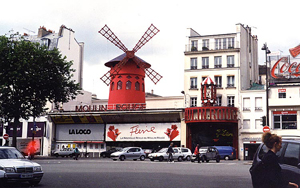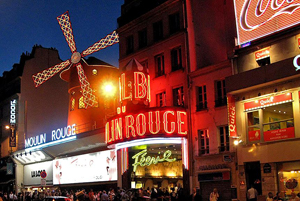-
2006-s-logo.jpg)
Number by catalogue: Yvert: 3995
Perforation type: 13 ¼x13 ¼
Subject:
54 cents. A tramway from new tram line T3*. One of tram stop is a Molin Rouge**
Additional:
*Paris Tramway Line 3
Opened on December 16, 2006, line T3 is the first modern tramway in Paris proper. It is known as the Tramway des Maréchaux because it follows the boulevards that were built on the route of Thiers' fortifications around Paris (built 1841-45) named after many of Napoleon's marshals (maréchaux). It connects Boulevard Victor RER station in the western part of the XVe arrondissement with Porte d'Ivry metro station in the XIIIe arrondissement.
The line is expected to carry 100,000 passengers per day.
Planned extensions include a link to Porte de Charenton in 2011 and eventually Porte de la Chapelle.
**Moulin Rouge(French for Red Windmill) is a cabaret built in 1889 by Joseph Oller, who also owned the Paris Olympia. Close to Montmartre in the Paris red-light district of Pigalle on Boulevard de Clichy in the 18th arrondissement, it is marked by the facsimile of a red windmill on its roof.
The Moulin Rouge is best known as the spiritual birthplace of the modern form of the can-can dance. Originally introduced as a seductive dance by the courtesans who operated from the site, the can-can dance review evolved into a form of entertainment of its own and led to the introduction of cabarets across Europe. Today the Moulin Rouge is a tourist destination, offering musical dance entertainment for adult visitors from around the world. Much of the romance of turn-of-the-century France is still present in the club's decor.
Notable performers at the Moulin Rouge have included Ella Fitzgerald, Liza Minelli, Elton John, La Goulue, Josephine Baker, Frank Sinatra, Yvette Guilbert, Jane Avril, Mistinguett, Le Pétomane, Édith Piaf and others. The Moulin Rouge is also the subject of paintings by post-impressionist painter Toulouse-Lautrec.

Paris tramway
France 2006.12.16
In issue: Stamp(s): 1
Issued in: sheets of 50 stamps